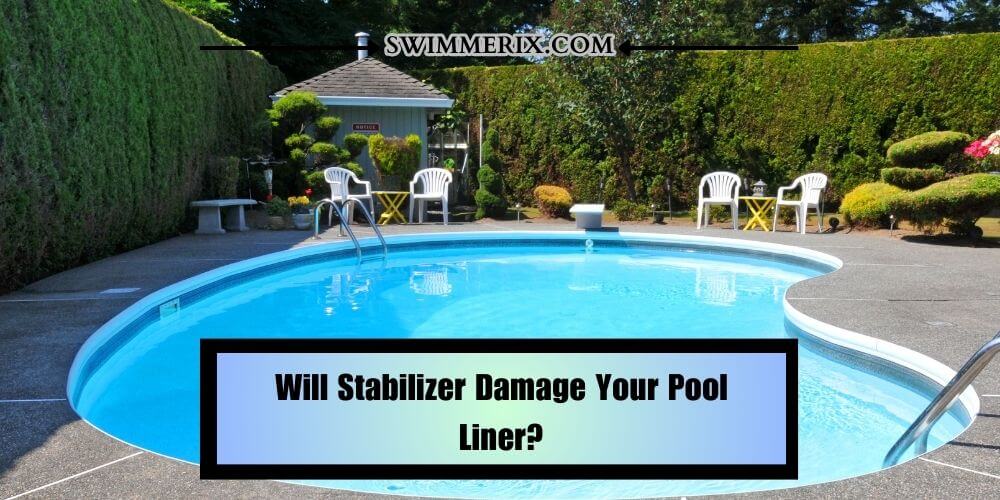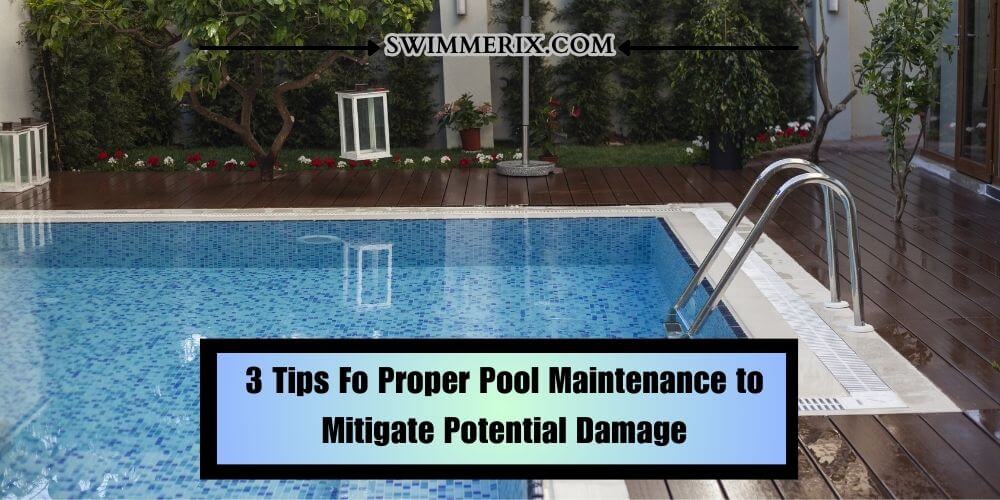
If you are worried about stabilizers damaging your pool liner, this article is for you. In this article, I will answer ‘Will stabilizer damage your pool liner?’ and their potential impact on your pool liner’s integrity.
We will also provide you with some tips & considerations for using stabilizers with poor liners. Since stabilizer damaging the pool liner is a valid concern, especially considering your investment in your pool, it is important to understand this intriguing topic clearly. So, without wasting time, let’s find out, ‘Will stabilizer damage your pool liner?’
Will Stabilizer Damage Your Pool Liner?

If the stabilizer is used properly & in the correct concentration, it will not have any typical damage to the pool liner. However, an excessive amount of stabilizer can cause problems. If the stabilizer level is high, the chlorine will be less effective, allowing algae growth & other contaminants, leading to stains & discoloration of the pool liner over time.
Stabilizers, also known as cyanuric acid, are one of the most commonly used chemicals in swimming pools to protect chlorine from the degrading effects of sunlight. However, if you are using it properly & in the correct concentration according to the manufacturer’s recommendation, you will find no damage to the pool liner.
However, make sure to check other chemical parameters in your pool water because Too Much Muriatic Acid in the Pool can interfere with cyanuric acid ability to protect chlorine. Also, you can consider check my other article on which acid is better inbetween: Dry Acid vs Muriatic Acid
But, also make sure you are not using too much of a stabilizer as it will also have a negative impact. If your pool has a high level of stabilizers, it will lead to a condition known as chlorine lock.
Chlorine Lock?
During chlorine lock, chlorine becomes less effective in sanitizing the water properly. This further leads to the growth of algae & other contaminants and makes the water visibility very poor, like cloudy.
It may also result in deposit formation on your pool surface, including the liner. People usually refer to these deposits as calcium scales that can be challenging to eliminate and may result in cosmetic problems on the liners.
If you want to prevent this kind of issue, Washington County, MN advise to use the stabilizer like cyanuric acid in the recommended dosage & maintain its level within 30-50 parts per million.
Additionally, ensure you regularly test your pool water, maintain proper water balance, and perform maintenance to guarantee appropriate usage of the stabilizer and prevent harm to your pool liner.
Suppose you have any other concerns regarding using stabilizers or maintaining your pool. In that case, I will advise you to consult your pool professional for specific advice based on your pool’s unique circumstances.
You should also note that the effect of stabilizers on the liner depends upon the quality of the liner and the material used.
Pool liners incorporate various medical materials, each possessing distinct properties and susceptibilities. Nonetheless, vinyl, fiberglass, and concrete stand out as the most frequently employed materials for constructing pool liners.
Below I am mentioning the effects of stabilizers on different types of pool liners & their vulnerabilities.
3 Effects of Stabilizers on Pool Liners
Vinyl Liner
As I told you in the above section, stabilizers do not directly damage the vinyl liners. Still, their improper use or excessive level may lead to chemical reactions and discoloration. Also, you should know that vinyl is a popular choice due to its versatility & affordability but can be susceptible to many other factors, including UV exposure, chemical imbalances & poor maintenance practices. Therefore, you must maintain appropriate stabilizer levels to ensure the longevity of your vinyl liner.
Fibreglass Liners
Another popular liner that is known for its durability, as well as resistance to fading, is fiberglass liners. However, you should know that fiber class liners are also affected by chemical imbalances & prolonged exposures to UV rays, leading to potential degradation & weakening over time.
In addition, if the stabilizers are in high concentration, it will cause further damage to the fiberglass liners. According to my research, I learned that stabilizers, also known as cyanuric acid, can lead to delamination & weakening of the fiberglass material if left on prolonged exposure. Therefore, ensure you strike a proper balance when using stabilizers to protect your fiberglass liners.
Concrete Liners
Since concrete pools offer more strength & customization, it is widely adopted in many countries. However, their liners are not exempt from potential damage. Through my research, I learned that chemical imbalances caused by excessive stabilizer levels can affect the coloring or painting of the concrete liner. It will not lead to unsightly discoloration but also affect the structural integrity of the concrete liner.
3 Tips Fo Proper Pool Maintenance to Mitigate Potential Damage

If you want to avoid the potential damage cost by the stabilizers, adhere to the proper pool maintenance. Below I’m mentioning some tips & best practices that can protect your pool liner and minimize the risk of the stabilizer effect.
- Regular Testing: Make sure you are doing regular testing & maintaining a schedule to monitor the stabilizer and water chemical levels to ensure they remain within the recommended range for your specific cold type.
- Balance Chemicals: You must strike a proper chemical composition in your pool by monitoring its pH, alkalinity, and chlorine level. This will not only prevent chemical imbalances that may contribute to their liner damage but also keep your water crystal clear & healthy for swimming.
- Dilution & Water Circulation: I often like to dilute the stabilizer concentration by partially draining & refilling my pool periodically. You should also follow this and ensure proper water circulation to distribute the chemical evenly & minimize localized damages.
3 Considerations for Using Stabilizers with Pool Liners
After exploring the potential impact of stabilizers on poor liners, it is important that you also pay attention to some important considerations when using stabilizers to protect your poil & giving it a crystal clear aesthetic look.
Manufacturer Guidelines
It is highly advised to always stick with the manufacturing guidelines & recommendations regarding stabilizer dosage for your specific pool liner type. Most stabilizers also come with specific instructions tailored to maximize liner longer.
However, if you need help determining the ideal stabilizer use, consider consulting a professional pool service provider or asking the local pool supply store owner for recommended dosage.
Optimal Stabilizer-to-Chlorine Ratio
Ensure you are maintaining an appropriate stabilizer-to-chlorine ratio as recommended by professionals or your pool manufacturer to ensure an effective balance between them and preserve the integrity of your pool liner.
As I told you earlier, excessive usage of the stabilizers may affect the chlorine’s effectiveness in clearing the pool water, further leading to the accumulation of debris, dirt contaminants & algae growth. Did you knew that people are also using Baquacil, instead of chllorine nowadays? To know more about it, check: Baquacil vs. Chlorine
Alternative Pool Maintenance Methods
Ensure you’re also considering the alternative pool maintenance methods that can reduce your Reliance on the stabilizers. Generally, a saltwater system or non-stabilized chlorine is the viable option that helps minimize the potential impact on the poor liner while ensuring proper sanitization.
Conclusion
So, ‘will stabilizer damage your pool liner’? The answer is it depends. Generally, stabilizers are safe for poor liners, but excessive usage of stabilizers may affect the chlorine level, putting strain on the poor liner.
You should know that stabilizer can still pose a risk if you don’t manage it properly. Therefore, please pay attention to the maintenance & adherence to recommended guidelines to mitigate their potential impact.
I have given my best to give you an in-depth answer to the question ‘Will stabilizer damage your pool liner’ along with the vulnerabilities of different pool liner materials & necessary precautions you need to take to enjoy a beautiful & well-maintained pool for many years.
If you have any other concerns regarding the question, will the stabilizer damage your pool liner? Nevermind dropping a comment below. If you find this article helpful, then consider sharing it.
Your share will not only help people learn about the vulnerabilities of different types of pool liners with the usage of stabilizers but also learn the answer to the question, ‘Will stabilizers damage pool liners.’ Check my other helpful guide on pool care & maintenance shared on this website. See you in the next post, till then, take care & goodbye.
